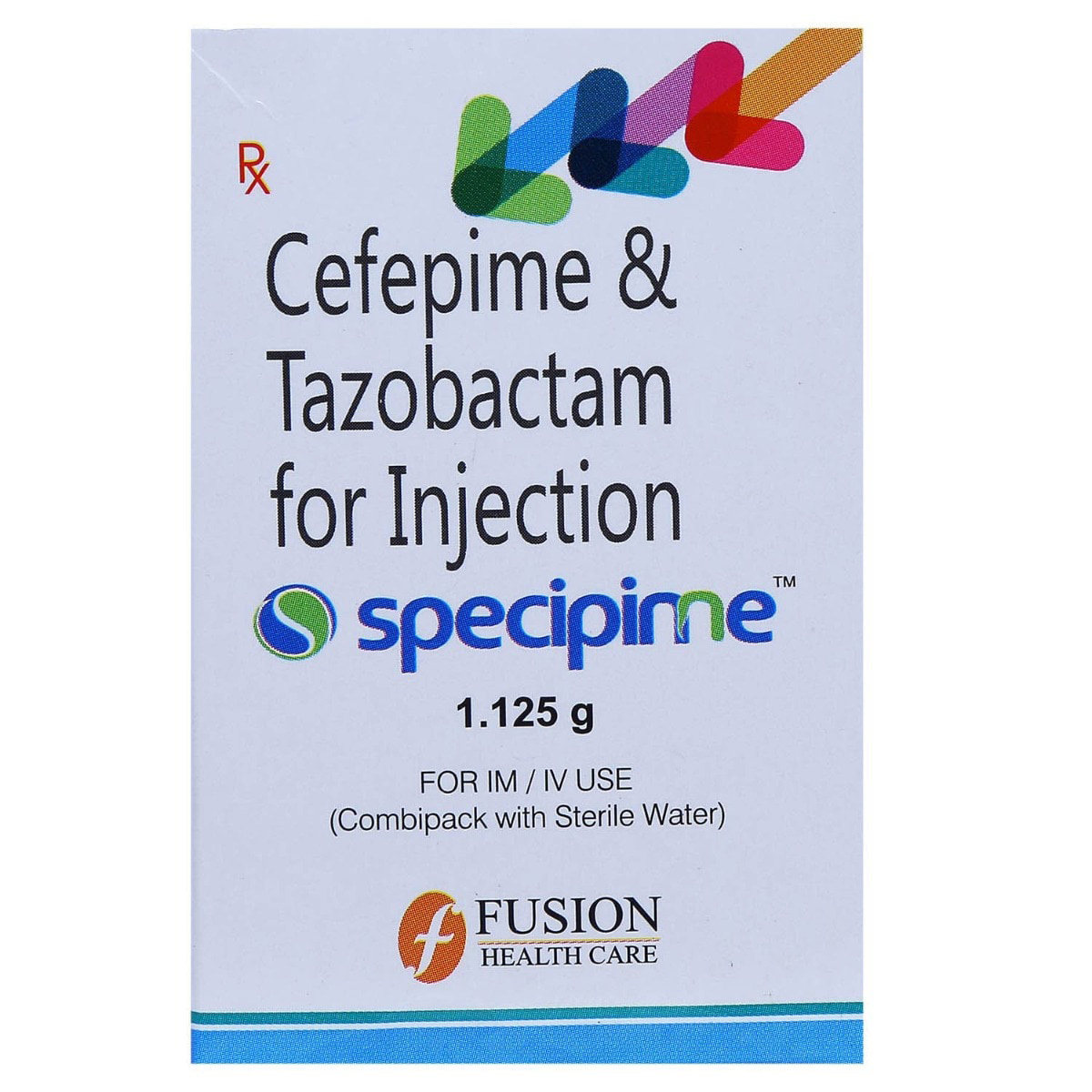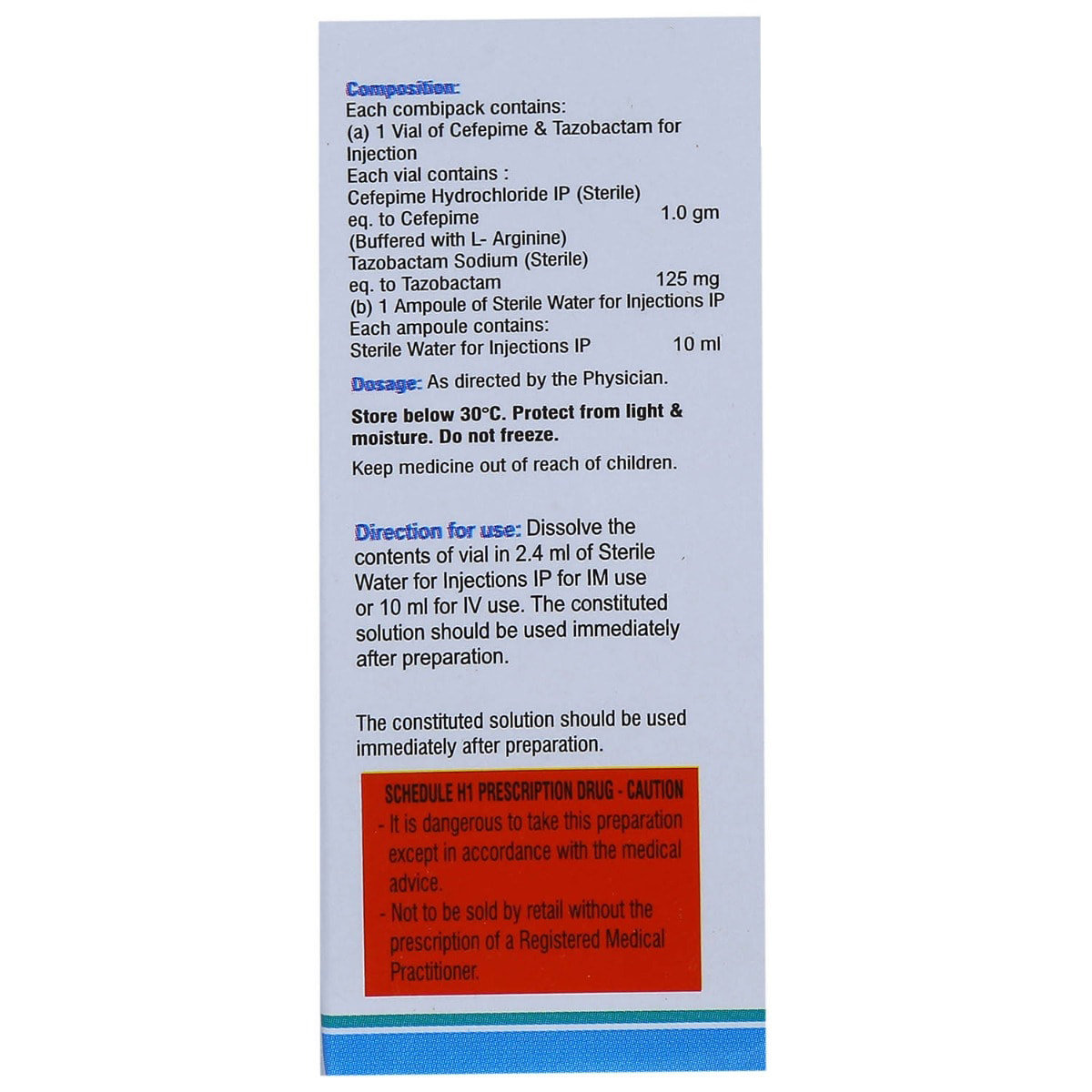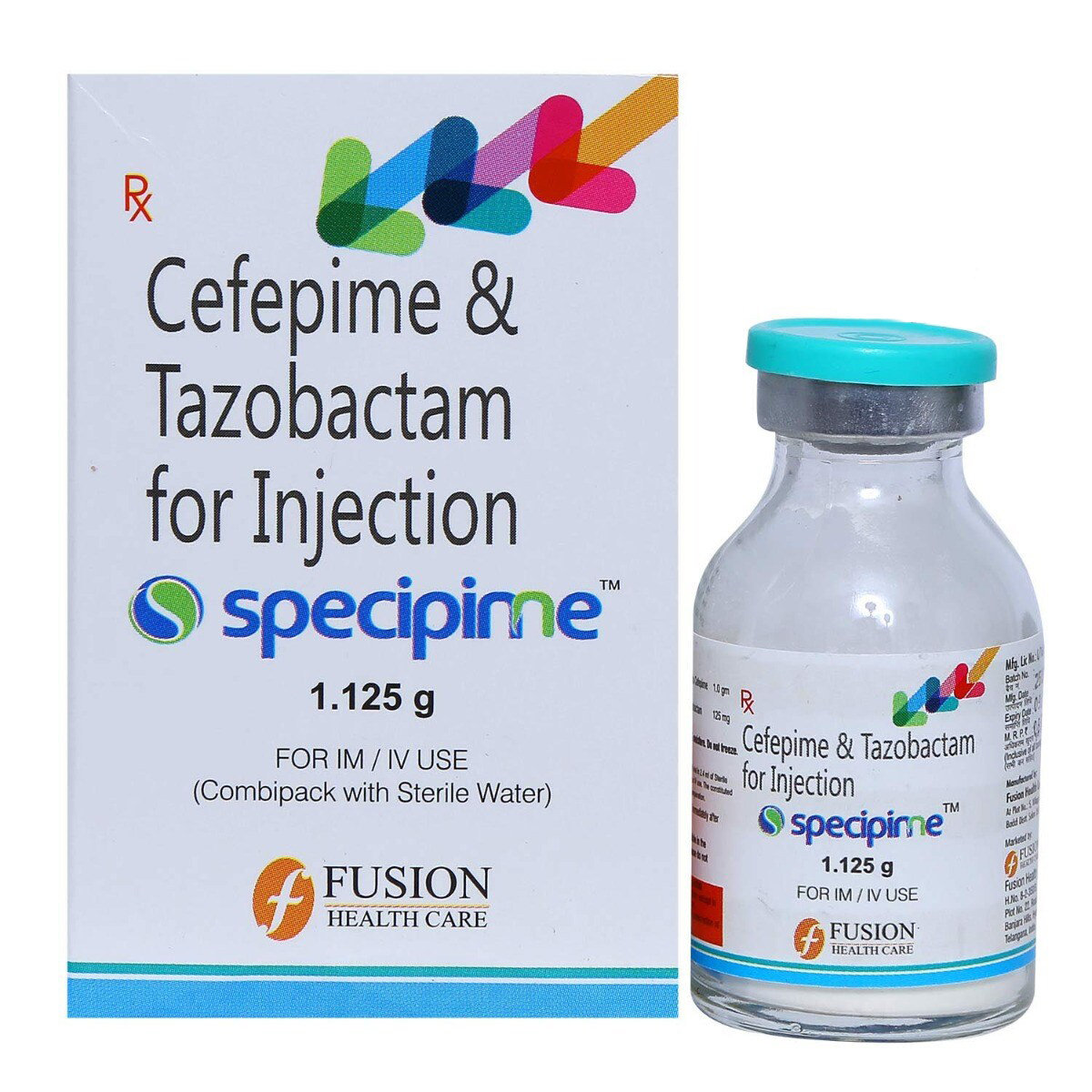Specipime 1.125 gm Injection 1's
MRP ₹467.5
(Inclusive of all Taxes)
₹70.1 Cashback (15%)
Know Your Delivery Time
Provide Delivery Location

Secure Payment

India's Most Trusted Pharmacy

Genuine Products
Composition :
Manufacturer/Marketer :
Consume Type :
Return Policy :
Expires on or after :
About Specipime 1.125 gm Injection
Specipime 1.125 gm Injection belongs to the class of medications called ‘antibiotics’ used to treat bacterial infections. Bacterial infections are caused by the multiplication of harmful bacteria inside or on the body. These harmful bacteria produce chemicals known as toxins, which can damage tissue and make you sick. Symptoms of bacterial infection vary depending on the organ affected by bacteria.
Specipime 1.125 gm Injection is a combination of two medicines: Cefepime and Tazobactam. Cefepime is a cephalosporin antibiotic. It has bactericidal action (kills bacteria). It works by preventing the formation of the cell wall (the outer protective layer of bacteria, which is essential for its survival) by preventing protein synthesis. Tazobactam is a beta-lactamase inhibitor. It can improve the spectrum of antibacterial action by inhibiting the action of beta-lactamase. Beta-lactamase is an enzyme produced by bacteria that can destroy antibiotics (cefotaxime). Specipime 1.125 gm Injection is only used to treat bacterial infections and is not recommended for viral infections.
Specipime 1.125 gm Injection will be administered by a healthcare professional; do not self-administer. The common side effects of Specipime 1.125 gm Injection are pain and swelling at the injection site and skin rash. These side effects are usually mild and temporary. However, if any of these side effects persist or get worse, inform your doctor immediately.
It is not recommended to take Specipime 1.125 gm Injection if you are allergic to penicillin, any cephalosporin antibiotic, or its contents. Before taking Specipime 1.125 gm Injection, inform your doctor if you have kidney problems, diabetes, gastrointestinal problems, especially colitis (inflammation of the large intestine), or use other antibiotics. Do not discontinue or abruptly stop using Specipime 1.125 gm Injection as it may lead to antibiotic resistance (bacteria become resistant to antibiotics). This medicine is not recommended in children aged less than two years. Specipime 1.125 gm Injection should be used with caution in pregnant women, breastfeeding mothers and elderly people. Specipime 1.125 gm Injection may interact with alcohol. Specipime 1.125 gm Injection may not affect your ability to drive.
Uses of Specipime 1.125 gm Injection
Specipime 1.125 gm Injection is used in the treatment of various moderate to severe bacterial infections. The detailed uses of Specipime 1.125 gm Injection are as follows:
- Urinary Tract Infections (UTIs): Specipime 1.125 gm Injection is effective against uncomplicated and complicated UTIs affecting the bladder (cystitis), ureter (ureteritis), and kidneys (pyelonephritis).
- Skin and Soft Tissue Infections: Specipime 1.125 gm Injection is used to treat bacterial infections of the skin and underlying tissues, such as wounds, abscesses, and cellulitis.
- Intra-abdominal Infections: Specipime 1.125 gm Injection helps in treating infections within the abdominal cavity, such as peritonitis and abdominal abscesses.
- Lower Respiratory Tract Infections: Specipime 1.125 gm Injection is used to treat infections in the airways (bronchitis) and lungs (pneumonia) caused by susceptible bacteria.
- Bloodstream Infections: Specipime 1.125 gm Injection is effective in treating sepsis, particularly caused by gram-negative bacteria.
- Empiric Therapy in Febrile Neutropenia: Specipime 1.125 gm Injection is given as a first-line treatment in patients with a low neutrophil count and fever (febrile neutropenia), particularly those undergoing chemotherapy.

Have a query?
Directions for Use
- Follow your doctor's instructions on the dosage and timing of this medication.
- Specipime 1.125 gm Injection will be administered by the doctor or nurse in a healthcare setting.
- Do not self-administer.
Medicinal Benefits
Specipime 1.125 gm Injection contains Cefepime and Tazobactam. Cefepime is a cephalosporin antibiotic, whereas Tazobactam is a beta-lactamase inhibitor. Specipime 1.125 gm Injection has broad-spectrum activity and is effective against both gram-positive and gram-negative bacteria. It makes the drug effective in multiple moderate to severe bacterial infections such as urinary tract infections (UTI), skin infections, intra-abdominal infections, lower respiratory tract (lung) infections such pneumonia (inflammation of the air sacs present in lungs) and bronchitis (inflammation of the bronchi), septicemia (including infections of the bloodstream), and empiric treatment in febrile neutropenic patients (development of fever in patients with low neutrophil count).
How Specipime 1.125 gm Injection Works
Storage
- To improve liver health and aid in the removal of toxins, drink lots of water.
- Alcohol consumption should be reduced or stopped because it can raise ALT levels and impair liver function.
- Consume a well-rounded diet full of whole grains, fruits, and vegetables. Limit items that strain the liver, such as processed, fatty, or fried foods.
- You can monitor your ALT levels and make treatment modifications with the support of routine blood tests.
What if I have taken an overdose of Specipime 1.125 gm Injection
Drug Warnings
Specipime 1.125 gm Injection should be used with caution in patients with kidney impairment. There is a risk of serious adverse events such as confusion, hallucinations, stupor (a state of near-unconsciousness), and seizures (fits). Specipime 1.125 gm Injection may cause Clostridium difficile-associated diarrhoea (CDAD), ranging from mild diarrhea to fatal colitis (inflammation of the large intestine). If CDAD is suspected or confirmed, the doctor may discontinue therapy and advise appropriate fluid and electrolyte management, protein supplementation, and antibiotic therapy to treat CDAD. A Specipime 1.125 gm Injection may cause positive direct Coomb’s test, which indicates antibodies against red blood cells. So, it is necessary to let your doctor know that you are taking this medicine before undergoing laboratory tests. Do not discontinue or abruptly stop the medication as it may lead to antibiotic resistance, a condition in which bacteria become resistant to antibiotics. Specipime 1.125 gm Injection may cause superinfection (additional infection caused by other microbes) on prolonged use.
Drug-Drug Interactions
Drug-Drug Interactions
Login/Sign Up
Taking the cholera vaccine after or along with Specipime 1.125 gm Injection may reduce the activity of the vaccine.
How to manage the interaction:
Although taking Specipime 1.125 gm Injection and Cholera vaccines together can evidently cause an interaction, it can be taken if your doctor has suggested it. Make sure to inform the doctor if you are on Cholera vaccine dose or you have already taken it. You should wait at least 14 days after finishing your antibiotic treatment before receiving the cholera vaccine in order to ensure an appropriate immune response. In case of any unusual side effects, consult a doctor. Do not stop using any medications without a doctor's advice.
Taking the cholera vaccine after or along with Specipime 1.125 gm Injection may reduce the activity of the vaccine.
How to manage the interaction:
Although taking Specipime 1.125 gm Injection and Cholera, live attenuated together can evidently cause an interaction, it can be taken if your doctor has suggested it. Make sure to inform the doctor if you are on Cholera vaccine dose or you have already taken it. You should wait at least 14 days after finishing your antibiotic treatment before receiving the cholera vaccine in order to ensure an appropriate immune response. In case of any unusual side effects, consult a doctor. Do not stop using any medications without a doctor's advice.
Drug-Food Interactions
Drug-Food Interactions
Login/Sign Up
Diet & Lifestyle Advise
Probiotics should be taken after taking the full course of Specipime 1.125 gm Injection to restore some healthy bacteria in the intestines that may have been killed. Taking probiotics after antibiotic treatment can reduce the risk of antibiotic-associated diarrhoea. Certain fermented foods like yogurt, cheese, sauerkraut, kombucha and kimchi can help restore the intestine's good bacteria.
Include more fiber-enriched food in your diet, as it can be easily digested by your gut bacteria, which helps stimulate their growth. Thus, fiber-rich foods may help restore healthy gut bacteria after a course of antibiotics. Whole grains like whole-grain bread, brown rice should be included in your diet.
Avoid alcoholic beverages can make you dehydrated and also affect your sleep. This can make it harder for your body to aid the antibiotic in fighting off infections.
Habit Forming
Therapeutic Class
All Substitutes & Brand Comparisons
Alcohol
Caution
Specipime 1.125 gm Injection may interact with alcohol. Consult your doctor before consuming any alcohol.
Pregnancy
Caution
Specipime 1.125 gm Injection is a category B medicine and may not cause harmful effects to the unborn baby. However, it should be used in pregnant women only if prescribed by a doctor.
Breast Feeding
Caution
Specipime 1.125 gm Injection may pass into breast milk in small amounts. So, caution should be exercised when given to breastfeeding mothers.
Driving
Safe if prescribed
Specipime 1.125 gm Injection may not affect your ability to drive.
Liver
Caution
Specipime 1.125 gm Injection should be used with caution in patients with live diseases. The dose may have to be adjusted by your doctor.
Kidney
Caution
Specipime 1.125 gm Injection should be used with caution in patients with kidney diseases. The dose may have to be adjusted by your doctor.
Children
Caution
Specipime 1.125 gm Injection is not recommended for children below two years of age. It can be used safely in children above two years. Please consult your doctor for more information.
Heart
Consult your doctor
Please inform your doctor if you have a history of heart disease before using Specipime 1.125 gm Injection. Your doctor will prescribe it only if the benefits outweigh the risks.
Geriatrics
Consult your doctor
Limited information available for use of Specipime 1.125 gm Injection in elderly patients. Please consult your doctor.
FAQs
Specipime 1.125 gm Injection is used to treat bacterial infections.
Specipime 1.125 gm Injection contains Cefepime and Tazobactam. Cefepime reduces the infection by inhibiting bacterial growth. It disrupts the formation of the cell wall (outer layer), which is essential for bacteria's survival. Tazobactam inhibits the action of beta-lactamase, an enzyme produced by the bacteria to destroy antibiotics (cefepime).
The common side-effects of Specipime 1.125 gm Injection are pain and swelling at the injection site, diarrhea, nausea, vomiting, headache and skin rash. These side-effects are usually mild and temporary. However, inform your doctor immediately if any of these side-effects persist or get worse.
In individuals who have kidney problems, colitis (inflammation of the intestine), and diabetes, Specipime 1.125 gm Injection should be used with caution as this medicine may worsen the condition.
Specipime 1.125 gm Injection may cause diarrhoea like most of the antibiotics. So, if you find blood in stools (tarry stools) or experience severe diarrhoea, consult your doctor immediately. Taking plenty of fluids may help in preventing dehydration. Do not take any medicine on your own to treat diarrhoea.
People allergic to penicillin should not take Specipime 1.125 gm Injection as they may develop cross-sensitivity (sensitivity to drugs with similar structures). Specipime 1.125 gm Injection contains cefepime, which has a similar structure to that of penicillin.
Country of origin
Manufacturer/Marketer address
Disclaimer
Author Details
We provide you with authentic, trustworthy and relevant information
Reference
- https://www.accessdata.fda.gov/drugsatfda_docs/label/2012/050679s036lbl.pdf
- https://www.sanofi.in/-/media/Project/One-Sanofi-Web/Websites/Asia-Pacific/Sanofi-IN/Home/science-and-innovation/for-healthcare-professionals/product-information/Augeoz-API-June-2018.pdf?la=en
- https://go.drugbank.com/drugs/DB01606








